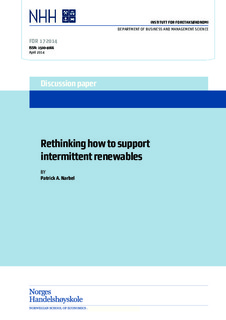Rethinking how to support intermittent renewables
Working paper

Åpne
Permanent lenke
http://hdl.handle.net/11250/194987Utgivelsesdato
2014-04Metadata
Vis full innførselSamlinger
- Discussion papers (FOR) [566]
Sammendrag
Intermittent renewable energy sources, including solar and wind power, typically remain
more expensive than conventional power sources. As a consequence, few intermittent power
projects would have been deployed if speci c policy instruments had not been implemented.
Existing policy instruments facilitating the deployment of intermittent renewable energy
technologies include the feed-in tari , the feed-in premium and the quota system. Based on
a numerical analysis, it is shown that these speci c policy instruments do not necessarily
facilitate the deployment of valuable energy sources because they ignore the cost of inter-
mittency. A valuable intermittent energy source is de ned here as a source of energy which
requires little nancial support and which limits the need for capacity payments in order to
ensure the security of supply. Based on insights from the numerical analysis, a new policy
instrument is suggested: a multiplicative premium. This type of policy instrument would
increase the likelihood that valuable intermittent energy assets are deployed in priority.